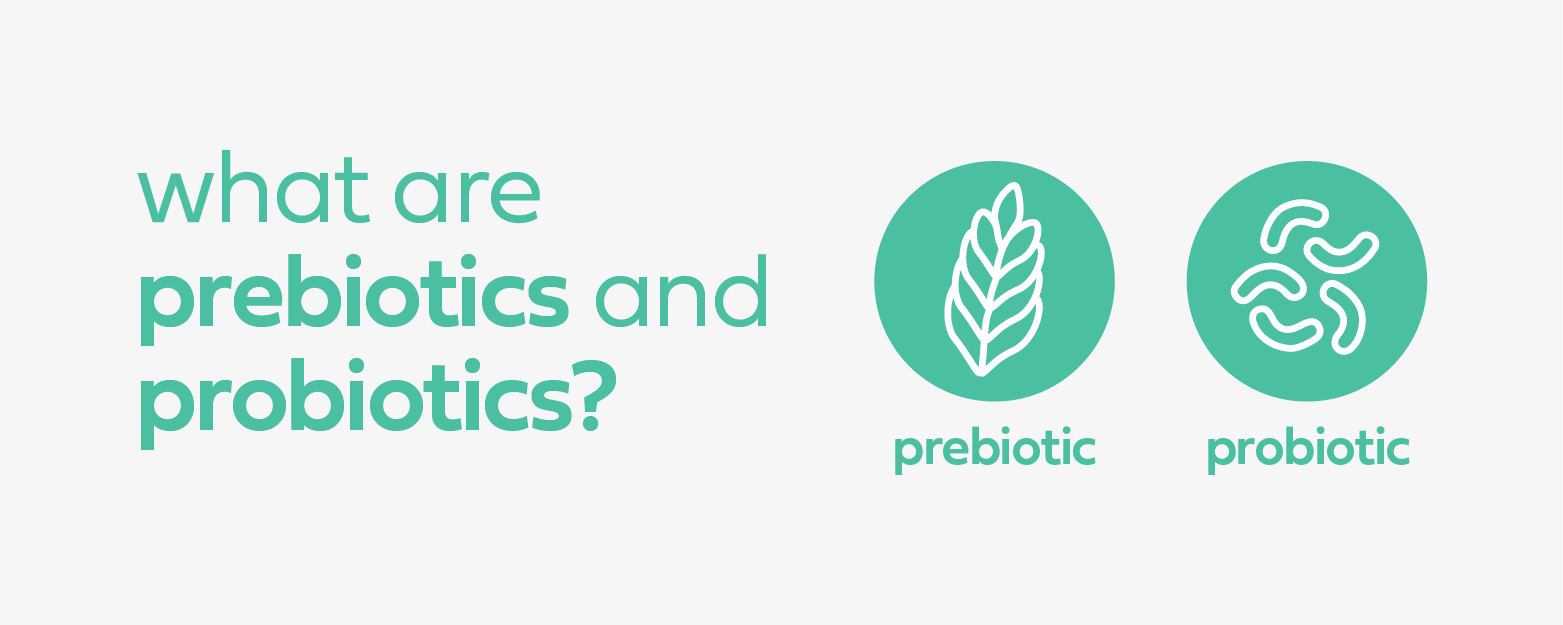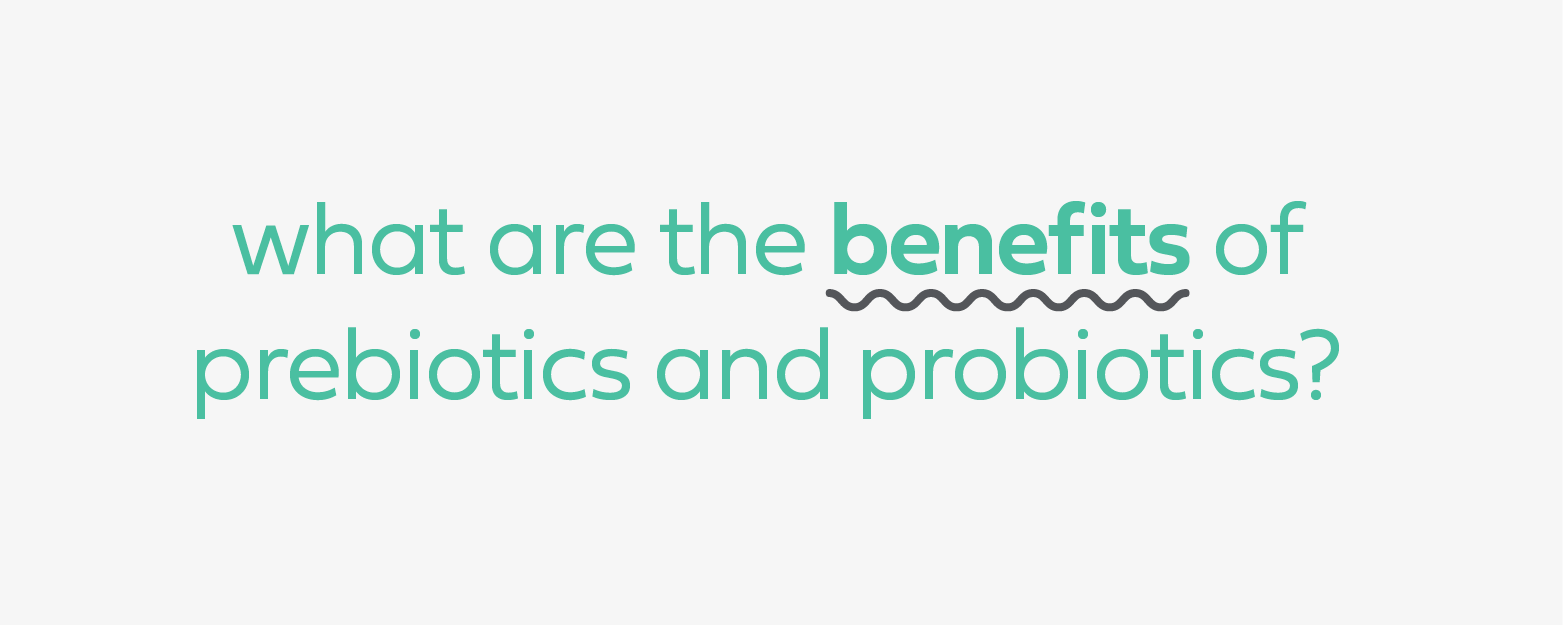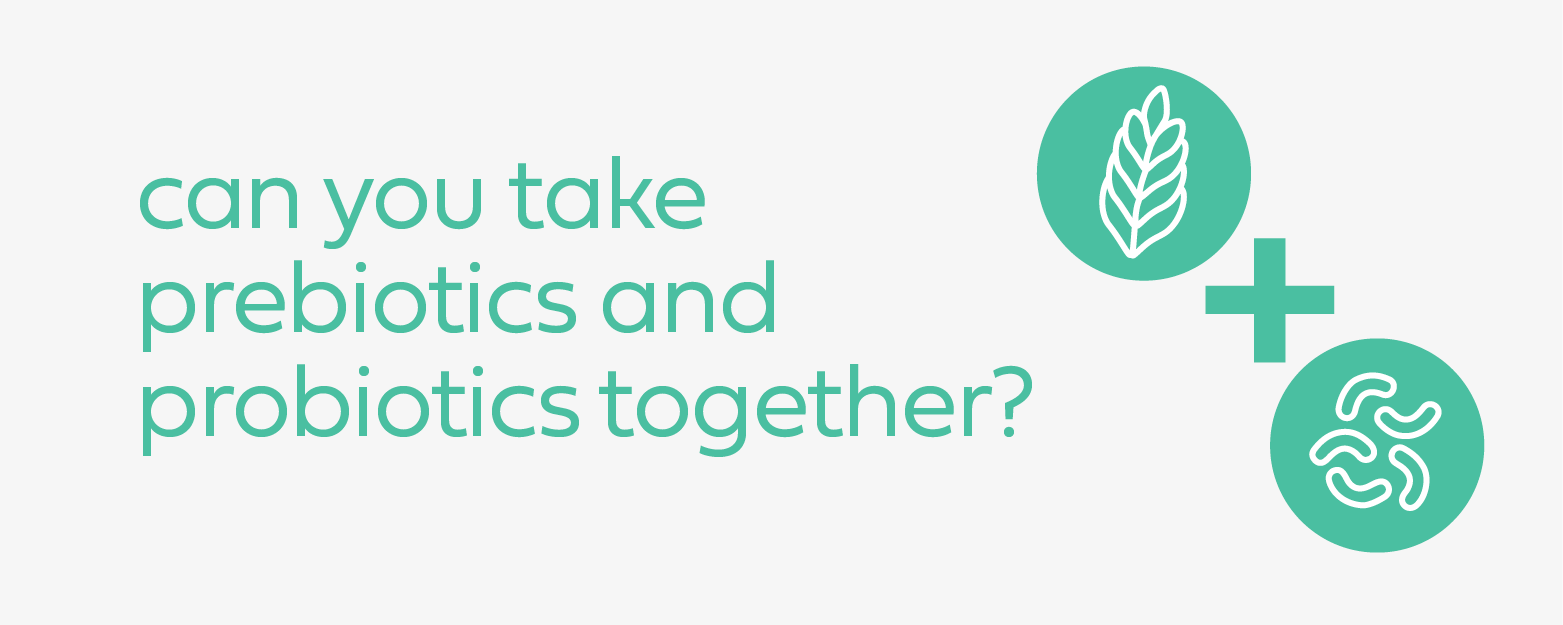Can you take prebiotics and probiotics together?

One question we get asked a lot is ‘can you take prebiotics and probiotics together’, and the short answer is yes. With that being said, we wanted to get a better understanding of prebiotics and probiotics and the benefits of taking them together so we spoke to our in-house experts to get the low down. Read on below to delve into the dynamic relationship between the two and discover how their synergy can enhance your wellbeing.
What are prebiotics and probiotics?

Prebiotics
So what are prebiotics? The official definition is ‘a substrate that is selectively utilised by host microorganisms conferring a health benefit’, but what does that actually mean? Prebiotics are indigestible natural fibres, which are a type of complex carbohydrate. These types of carbs can’t be broken down in the small intestine and instead pass through to the large intestine where they are broken down and fermented by the trillions of bacteria that naturally reside in the gut or from an external supply of probiotics that are introduced in supplement form.
This means that prebiotics act as a food source to the healthy bacteria which encourages their growth and population within our gut. Prebiotics are found naturally in the food we eat, for example in (but not limited to):
- Leeks
- Garlic
- Onions
- Bananas
- Artichokes
Prebiotics can also be taken in supplement form, which tends to provide higher levels than would be expected to be obtained from the diet alone. FOS, GOS and Inulin are the most recognised and researched prebiotics.
Probiotics
With a grasp on prebiotics, let’s delve into probiotics. The official definition of probiotics is ‘live microorganisms that, when administered in adequate amounts, confer a health benefit on the host’. Picture probiotics as the friendly live bacteria and yeasts that provide us with health benefits. Comprising the genus, species and strain, probiotics are all very different. While predominantly inhabiting the digestive system, they also find residence in the urinary and reproductive systems, as well as the skin. From birth, our body is colonised with trillions of bacteria and the composition and functionality can be affected by a number of factors throughout our lives. For further information, explore our blog on the interplay between good and bad gut bacteria.
Probiotics can be found in fermented foods and drinks and dairy products or can be taken in supplement form.
What is the difference between prebiotics and probiotics
Prebiotics are the indigestible carbohydrates that act as a food source to the friendly bacteria that reside in the gut, whereas probiotics are the friendly bacteria themselves. Both help support the growth and diversity of beneficial bacteria in the gut and are associated with a wide range of health benefits.
What are the benefits of prebiotics and probiotics?

Benefits of prebiotics
Prebiotics bring a host of benefits to the table, with their primary mission being to champion the growth of good bacteria in our digestive system. When our gut bacteria get to work fermenting prebiotics, this results in the production of a group of short chain fatty acids (SFAs) such as butyrate, propionate, and acetate.
These SFAs play a big role in nurturing a thriving gut environment, bolstering the health of our gut lining for efficient digestion and nutrient absorption, as well as kickstarting our digestive system for smoother bowel movements. But that’s not all, they don’t limit their efforts to the gut. They wield their anti-inflammatory abilities, not just in the digestive system but throughout the body. SFAs also double up as the key to releasing the hormone leptin, an appetite suppressant plus serves as a power-up for the good bacteria, further cultivating their growth in the gut.
Beyond these intricate processes, prebiotics have been applauded for their role in a plethora of health arenas too – from boosting digestion, immunity, and sleep, to enhancing metabolic health, skin radiance, and even aiding in weight loss. Lastly, prebiotics are pretty tough, as they’re not live organisms they are resilient in the acidic gut environment and can withstand heat too.
Benefits of probiotics
Probiotics step up as guardians of our gut and overall well being; they help to control the growth of harmful and pathogenic bacteria in various bodily realms, preventing infections and unwelcome infestations. While their central role revolves around bolstering the health of the gut microbiome, their influence extends to finely-tailored functions within this unique ecosystem. They actively contribute to the absorption of essential vitamins and minerals into the bloodstream, notably contributing to the production of B vitamins and vitamin K2 – vital for energy generation, cognitive vitality, and bone health.
But their benefits don’t end there; probiotics are key players in crafting specific chemical messengers, intricately linked to the functioning of our nervous system – like serotonin for example. Furthermore, emerging research underscores their role in fortifying our immunity, which interestingly finds about 70% of its stronghold within the gut. With growing evidence spotlighting their effectiveness in nurturing gut health, the realm of probiotics extends into new areas of research, encompassing the intricate interplay with skin health, immune resilience, intimate wellbeing, and even mental health.

Can you take prebiotics and probiotics together?
For the majority, taking both prebiotics and probiotics together is safe, unless when there is a severe health condition – in which case, a consultation with a medical professional is recommended. Preferences can also vary widely, with some people preferring a consolidated approach, while others opt to consume them separately or choose just one.
Specific strains of both prebiotics and probiotics have demonstrated effectiveness in addressing particular health concerns. Hence, a personalised selection of strains or their combinations can yield tailored advantages. Additionally, sensitivity to pre and probiotics may differ for each individual, prompting some to opt for lower initial doses, particularly during the initial stages of supplementation.
What are the benefits of taking them together?
The gut microbiome gets a double boost in two ways. First, it restores healthy bacteria within the microbiome and second, it provides the gut bacteria with what they need to grow and flourish. This optimises the health of the microbiome. It’s a two-pronged approach.
This can be fine-tuned according to individual requirements. Some people benefit from taking certain prebiotics and/or probiotics (or a combination of both) and some conditions have been shown to respond well to specific strains of pre and/or probiotics.
References
Gibson G et al., “Expert consensus document: The International Scientific Association for Probiotics and Prebiotics (ISAPP) consensus statement on the definition and scope of prebiotics,” Nature Reviews Gastroenterology & Hepatology , vol. 14, p. 491–502, 2017.
Hill C, Guarner F, Reid G, Gibson GR, Merenstein DJ, Pot B, Morelli L, Canani RB, Flint HJ, Salminen S, Calder PC, Sanders ME. Expert consensus document. The International Scientific Association for Probiotics and Prebiotics consensus statement on the scope and appropriate use of the term probiotic. Nat Rev Gastroenterol Hepatol. 2014 Aug;11(8):506-14. doi: 10.1038/nrgastro.2014.66. Epub 2014 Jun 10. PMID: 24912386.
Markowiak P and Śliżewska K (2017) Effects of Probiotics, Prebiotics, and Synbiotics on Human Health. Nutrients, 9(9): 1021
Magnúsdóttir S, Ravcheev D, de Crécy-Lagard V, Thiele I (2015) Systematic genome assessment of B-vitamin biosynthesis suggests co-operation among gut microbes. Frontiers in Genetics, 6, 148
O’ Kennedy D (2016) B Vitamins and the Brain: Mechanisms, Dose and Efficacy—A Review. Nutrients, 8(2): 68
Rodríguez-Olleros C, Curiel MD (2019) Vitamin K and Bone Health: A Review on the Effects of Vitamin K Deficiency and Supplementation and the Effect of Non-Vitamin K Antagonist Oral Anticoagulants on Different Bone Parameters. Journal of Osteoporosis, Article ID 2069176
Sanders M et al., “Probiotics and prebiotics in intestinal health and disease: from biology to the clinic,” Nature Reviews Gastroenterology & Hepatology volume , vol. 16, pp. 605-616, 2019.
Vulevic J et al., “Influence of galacto-oligosaccharide mixture (B-GOS) on gut microbiota, immune parameters and metabonomics in elderly persons,” British Journal of Nutrition, vol. 114, pp. 586-595, 2015.
Thomson R et al., “Dietary prebiotics and bioactive milk fractions improve NREM sleep, enhance REM sleep rebound and attenuate the stress-induced decrease in diurnal temperature and gut microbial alpha diversity.,” Front Behav Neurosci, vol. 10, p. https://doi.org/10.3389/fnbeh.2016.00240, 2017 .
Grimaldi R et al., “A prebiotic intervention study in children with autism spectrum disorders (ASDs),” Microbiome, vol. 6, p. 133, 2018 .
Beserra B et al., ” systematic review and meta-analysis of the prebiotics and synbiotics effects on glycaemia, insulin concentrations and lipid parameters in adult patients with overweight or obesity.,” Clinical Nutrition, vol. 34, pp. 845-858, 2015.
Abrams S et al., “Young adolescents who respond to an inulin-type fructan substantially increase total absorbed calcium and daily calcium accretion to the skeleton,” Journal of Nutrition, vol. 137, pp. 2524-2526, 2007.
Lolou et al., “Functional Role of Probiotics and Prebiotics on Skin Health and Disease,” Fermentation, vol. 5, no. 2, p. https://doi.org/10.3390/fermentation5020041, 2019.
Salem I et al., “The Gut Microbiome as a Major Regulator of the Gut-Skin Axis,” Front Microl, p. 9: 1459, 2018.
Kellow N et al., “Metabolic benefits of dietary prebiotics in human subjects: a systematic review of randomised controlled trials,” British Journal of Nutrition, vol. 111, pp. 1147-1161, 2014.
Reimer A et al., Prebiotics reduce body fat in overweight children. American Gastroenterological Association, 2017.
